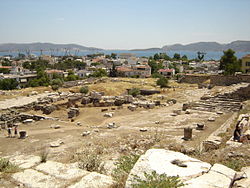This article needs additional citations for verification .(November 2024) |
| Years |
|---|
| Millennium |
| 1st millennium |
| Centuries |
| Decades |
| Years |
| 171 by topic |
|---|
| Leaders |
| Categories |
| Gregorian calendar | 171 CLXXI |
| Ab urbe condita | 924 |
| Assyrian calendar | 4921 |
| Balinese saka calendar | 92–93 |
| Bengali calendar | −423 – −422 |
| Berber calendar | 1121 |
| Buddhist calendar | 715 |
| Burmese calendar | −467 |
| Byzantine calendar | 5679–5680 |
| Chinese calendar | 庚戌年 (Metal Dog) 2868 or 2661 — to — 辛亥年 (Metal Pig) 2869 or 2662 |
| Coptic calendar | −113 – −112 |
| Discordian calendar | 1337 |
| Ethiopian calendar | 163–164 |
| Hebrew calendar | 3931–3932 |
| Hindu calendars | |
| - Vikram Samvat | 227–228 |
| - Shaka Samvat | 92–93 |
| - Kali Yuga | 3271–3272 |
| Holocene calendar | 10171 |
| Iranian calendar | 451 BP – 450 BP |
| Islamic calendar | 465 BH – 464 BH |
| Javanese calendar | 47–48 |
| Julian calendar | 171 CLXXI |
| Korean calendar | 2504 |
| Minguo calendar | 1741 before ROC 民前1741年 |
| Nanakshahi calendar | −1297 |
| Seleucid era | 482/483 AG |
| Thai solar calendar | 713–714 |
| Tibetan calendar | ལྕགས་ཕོ་ཁྱི་ལོ་ (male Iron-Dog) 297 or −84 or −856 — to — ལྕགས་མོ་ཕག་ལོ་ (female Iron-Boar) 298 or −83 or −855 |
Year 171 ( CLXXI ) was a common year starting on Monday of the Julian calendar. At the time, it was known in Rome as the Year of the Consulship of Severus and Herennianus (or, less frequently, year 924 Ab urbe condita ). The denomination 171 for this year has been used since the early medieval period, when the Anno Domini calendar era became the prevalent method in Europe for naming years.
